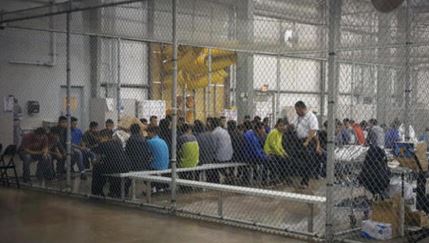Amidst horrifying images of people packed into cages without basic necessities, many Americans have cried that these images show a scenario that “isn’t us”.
But it’s more complicated than that.
It’s not true that this “isn’t us.” It is us; we have been living in a country that tortures kids in camps. The most pressing question being discussed at the highest levels at the moment is not how to stop it, but the exact measure in which to mete out these deprivations and humiliations. That is the present, and it is also the past. But, through movements and communities of people who care, we still, still, have the power to determine the future.
The legislative fight over emergency border funds intended to alleviate the abuse ended in betrayal. One version of the bill, while imperfect, would have strengthened health and safety standards in detention facilities and shelters and attempted to disallow the use of those funds for border enforcement measures. Because how do we trust the people running these camps to use any funding to properly care for migrants when even the supplies dropped at their doorstep for free have been refused? When the purpose of the massive spending that goes into even one day of one individual’s detention is clearly not migrants’ well-being but, much more likely, profit to private security contractors? But the version of the bill that prevailed had far fewer guardrails, spells out more detentions and deportations, and puts us further from a real solution.
Even if conditions could be somewhat improved, it is hard to see a path out of these camps because of fundamental differences in what we think is right. To some, the punishment that these camps represent is the problem, but to others, the problem is we aren’t punishing migrants enough. The right-wing has long claimed that migrants suffer, on the journey and at the hands of federal agencies, because immigration law isn’t strict enough to keep them away. Senator John Cornyn responds to news of migrant deaths by blaming “arcane laws” and the dead themselves. The president said that mass deportations would be held back only if we solve the “loopholes” in asylum law. They are saying the only way to stop the hurt machine is to shut the door.
The problem is none of that makes sense. The United States already hasn’t been doing its share on this front, and this administration has shrunk what numbers we do accept even further. The travel ban on predominantly Muslim countries. Reductions in refugees admitted per year. Zero tolerance. Unlawful rejection of asylum claims that are due to gang violence or domestic violence. Attacks on temporary protected status for immigrants who fled extraordinary conditions. Efforts to de-prioritize family ties and further emphasize skills, treating people not as inherently worthy of human rights but as units of economic value. All while the legislators responsible declare that America is the best country in the world. Maybe say that a little quieter if you don’t want to “entice” anyone to come?
All of that has already been happening. But the hurt hasn’t stopped. It just grows. The crackdown is never enough and will never be enough because railing against scary people of color is the biggest applause line, so we’re going to keep at it for as long as the applause continues.
There is a crisis of instability on an international level that is driving up migration, which will increase with climate change, and there is a crisis at home in how we treat people who come looking for a place to be safe. Doubling down on the show of toughness fixes neither.
Our elected officials have conceded too much to this version of normal. Right now the wedge is over just how to run the border camps. Why accept that refugees and migrants, in general, have to be locked up, to begin with? Why, in the words of presidential candidate Julián Castro, have we criminalized desperation? It is a lie that they don’t show up for hearings. It is a lie that they will hurt us. It is a lie that they will use up our resources. Why are they in a cage without having been convicted by due process of anything? Why are they in a cage for asking for help?
Let more in. Let more stay. That’s it. If only that was it.
There have been a lot of good resources out there on ways to help, like donating to RAICES and calling your reps. A lot of us feel powerless and overwhelmed nonetheless. That’s because these atrocities aren’t a singular choice by leaders today. These aren’t our first concentration camps, or second or third. The causes are deep-rooted. It is the whole structure. It is the whole conception, among those who hold the reins, of what kind of person is deserving and what kind of person is not. The scale of it is staggering, terrifying, infuriating, numbing, debilitating.
Here we are still, feeling those things. Caring about these things. And people who care have the power to determine the future.
We’re the kind of country that would torture kids in camps.
There are many things we can do to change that.
Engage, educate, organize. Find the fault lines in your own circles and your own communities, and press. Shift where the power is, and shift the culture.
Find one thing to do. Then find one thing to do. Don’t carry it all. Take care of yourself. Cultivate small hope.
We’re with you.

